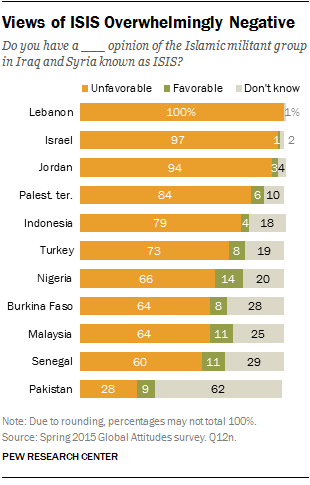Despite what you hear from the presidential campaign trail and most news outlets, worldwide Muslim attitudes toward the United States are improving, and most Muslims despise the Islamic State.
 Marv KnoxAccording to Foreign Policy, strong majorities in two countries with the largest Muslim populations, Indonesia and Nigeria, see the United States favorably. Meanwhile, anti-American sentiment has ebbed in areas such as the Palestinian territories, Pakistan and Turkey.
Marv KnoxAccording to Foreign Policy, strong majorities in two countries with the largest Muslim populations, Indonesia and Nigeria, see the United States favorably. Meanwhile, anti-American sentiment has ebbed in areas such as the Palestinian territories, Pakistan and Turkey.
Although anti-Americanism is strong in Middle Eastern countries where polls have been conducted, Egypt stands alone as the only country where negative U.S. sentiment has increased.
“Attitudes toward the United States are the product of multiple factors,” Foreign Policy notes. “The U.S. invasion of Iraq in 2003 and the subsequent chaos were deeply unpopular in many predominantly Muslim countries and harmed the U.S. image both in the region and as far afield as Indonesia and Pakistan.
“But Muslim stereotypes of people in the West also help explain some of this anti-Americanism. Six in 10 or more Muslims across seven largely Muslim countries considered Westerners to be selfish, violent, greedy and immoral. … Only about three in 10 saw Westerners as honest, tolerant and generous.”
No Islamic consensus
Still, a solidified Islamic consensus does not exist, Foreign Policy reports, explaining, “Muslims outside the United States are divided in their view of America, just as Americans are divided in their views of Muslims.”
On the other hand, even though the Islamic State claims to represent its faith accurately, most Muslims worldwide hold the resurgent movement in lower regard than they do the United States.
The Christian Science Monitor reports reports the majority of people in countries with large Muslim populations “disdain” the Islamic State, also commonly known as ISIS.
Sign up for our weekly edition and get all our headlines in your inbox on Thursdays
 The Monitor cites a Pew Research Center survey conducted last year in 11 strongly Muslim countries.
The Monitor cites a Pew Research Center survey conducted last year in 11 strongly Muslim countries.
In Lebanon, 99 percent of the population views ISIS unfavorably. Not surprisingly, that sentiment is shared by 97 percent of Israelis. But vast majorities in other countries agree—such as Jordan (94 percent), the Palestinian territories (84 percent), Indonesia (79 percent) and Turkey (73 percent).
The only surveyed country in which a minority see ISIS unfavorably is Pakistan (28 percent). But even there, the vast majority (62 percent) say they don’t know what they think about ISIS.
The strongest national favorable rating for ISIS is only 14 percent in Nigeria, where 66 percent of the population thinks unfavorably of ISIS.
No Muslim monolith
Despite what we hear from politicians, pundits and provocateurs, Americans make a mistake when we think of Islam as monolithic. Yes, some Muslims interpret the Quran as condoning terrorism. But that is only a subset. Research shows millions of Muslims—and a number that continues to grow—worldwide see Islam as a faith of peace, do not condone terrorism and do not wish to be at “war” with Christianity and the West.
Of course, we must be on guard against terrorism of any form. We live in a dangerous world, and responsibility demands vigilance. That said, we are neither truthful nor fair when we treat Islam and all Muslims as synonymous with terrorism and violence.
Lessons learned …
So, what—in addition to the facts—can we learn from these recent surveys?
• Politicians, cable news anchors and others who treat Muslims as a violent monolithic whole are dishonest and prey on fear. Their actions cast doubt on their credibility. If they’ll mislead and manipulate regarding Islam, they’ll do the same on other issues.
• The safest path forward—particularly in the United States and elsewhere in the West—involves cooperation between Christians, peace-loving Muslims and other faith groups. And the strongest foundation for cooperation is honesty, mutual respect and open dialogue, which only can be achieved by acknowledging the character and virtue of peaceful Muslims.
• If we follow Jesus’ Great Commission and wish to share our faith in him with Muslims, we cannot expect to be successful apart from building authentic, caring relationships. Love and acceptance provide the basis for these relationships.
Christians who treat all Muslims as terrorists and/or condemn peaceful Muslims for the terrorism of Muslim extremists might as well deny the Great Commission and tell all Muslims to go to hell.
















We seek to connect God’s story and God’s people around the world. To learn more about God’s story, click here.
Send comments and feedback to Eric Black, our editor. For comments to be published, please specify “letter to the editor.” Maximum length for publication is 300 words.